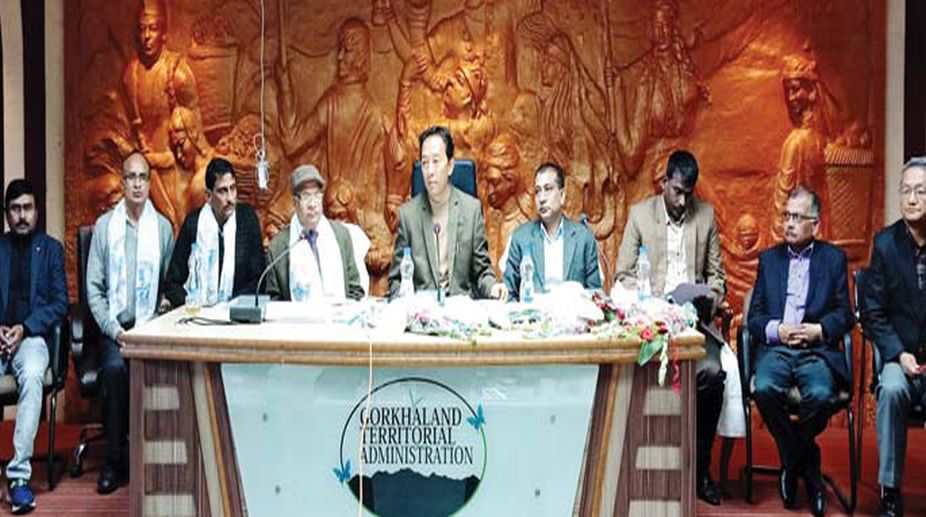Railway project to rejuvenate Gwalior station on lines of airport
On Monday, Prime Minister Narendra Modi virtually inaugurated the rejuvenation work of the 145-year-old Gwalior Railway Station.

Gorkhaland Territorial Administration.
Chairman of the Gorkhaland Territorial Administration (GTA) Board of Administrators Binoy Tamang on Wednesday said that the GTA would finally issue a no-objection certificate (NOC) for Sikkim’s first railway project in a week’s time after railway officials agreed to meet the demands put forth by the Hill body.
After a meeting Mr Tamang held with six top officials of the Indian Railways from Delhi and Guwahati at Lalkothi here on Wednesday, he said that forest villagers would not be affected by the Sevoke- Rangpo rail line project and that the demand for the Forest Rights Act was being taken up with the central and state governments.
Advertisement
“The foundation stone was laid for this project when the present Bengal chief minister was the Railway minister in 2009, but the project could not take off due to political disturbances and some technical difficulties. There were discussions going on regarding the NOC, and keeping in mind the public sentiments and welfare, we had made some demands, which they have agreed to meet,” Mr Tamang said on Wednesday.
Advertisement
“Moreover, this is also an important project that has national interests, with Darjeeling very near and Sikkim sharing borders with China. Looking at the Railways’ agreement to what we had asked for, we will issue the NOC within a week’s time,” he added.
According to him, the project cost in the year 2008-2009 was Rs 1339.48 crore, while the same went up to Rs 4084.69 crore in 2015, and with further delay, it has escalated to anywhere between Rs 5,500 crore to Rs 6,000 crore now.
The total distance that the railway line will cover from Sevoke in West Bengal to Rangpo in Sikkim will be 44.98 km, with a major portion of the tracks (41.52 km) falling in areas under the GTA.
The project will have 14 tunnels dug at a depth of 30 metres to 1 km. About 38.46 km of the rail line will be underground, it is learnt. Apart from that, there will be 22 bridges with 14 of them being major ones, the GTA chief said.
“We had demanded railway stations in the GTA area also, apart from Rangpo in Sikkim, and they have agreed to make one each at Sevoke, Riyang, Melli and one underground station at Teesta. Apart from that, they have also agreed to social welfare schemes for the people in that area, for which we have also asked for a monitoring committee, comprising representatives of the GTA and the railways, which they have agreed. This committee will look into the various problems that could arise for the people when the project is being constructed. After it finishes, the panel will also look into the social welfare schemes,” Mr Tamang said.
According to him, the railways will be using the New Austrian Tunneling Method (NATM) for digging the tunnels which will be “vibrationless.” “It is a safe method that will also not affect the eco system,” Mr Tamang said.
He added that the project would also ensure self employment in a 10-km radius of railway stations with hotel, restaurant and taxi business thriving. On the demands of forest villages, Mr Tamang said, “The project will not affect the forest villagers, as about 80 percent of the rail lines will pass through tunnels. The Railways has assured us that it will not allow them to be affected. As for their demand of Forest Rights Act, there are 168 forest villages in the GTA area and all should come under it. We have taken up this matter with both the state government and the Centre.”
Chief Administrative Officer the Northeastern Frontier Railway, A Prakash said the railways guarantees that all issues of public concern and commitments given will be fulfilled.
“It will take 4-5 years for the project to complete once work begins,” he said,” adding that the NATM method for tunnel-digging is used worldwide with it already used in Kashmir, Manipur and Mizoram. He also said that their dream was to take the railway line right up to Nathula on the China border.
Advertisement